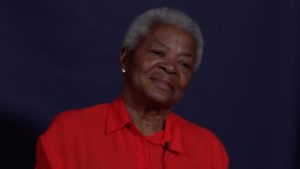
Constance Thomas was born in the Commonwealth of Dominica and migrated to Canada in 1974 after receiving Registered Nurses (RN) training at the University Hospital in Jamaica. After holding RN positions in two hospitals and a care home in Coronation, Lacombe and Red Deer, she trained in midwifery in England because she wanted to further her studies for a higher degree.
The attached transcript contains excerpts from a longer interview conducted by the Alberta Labour History Institute1 in which Constance Thomas talks about her connections to Jasper Place where she worked for a few years. After returning to Alberta in 1977, she was immediately hired as an RN in Labour and Delivery at the Misericordia Hospital. Finding a job was easy but, as a single Black parent, finding a place to live near the hospital turned out to be impossible. Here she describes why she needed to work two jobs because of that racism:
I needed the money from both of them because I had to have a car; I had to buy something. And that’s what the problem was. Because you can’t rent, you have to buy. Nobody would rent you a house if you had a child. Double jeopardy – you have a child, you’re a woman, and you’re Black. So you walk up and down 87th Avenue at all the apartments that were there then. They would advertise it in the paper, in the Journal or wherever. You would call, “Okay, come and see it.” When they saw you, the apartment was taken. I didn’t realize how prevalent that was at the time because I’m not concentrating on prejudice or anything like that. I didn’t think I was different to that extent because I had never been treated that way until Edmonton – never. When I came to Edmonton and couldn’t find a place, I had to buy a condo. So now you’re committed.
The condo Thomas purchased was west of 170th Street in Belmead before West Edmonton Mall was built: “just this big morass, like a swamp place next to the Mis.” Because public transit was only available from Meadowlark Mall, and was sketchy at best, she also had to buy a car.
Thomas was a member of the United Nurses of Alberta (UNA), which formed in May 1977 and soon represented RNs at the Misericordia. She joined many demonstrations at the Misericordia Hospital for better working conditions, hours of work, and pay during the late 1970s, and participated in the UNA strike launched in April 1980, “I picketed during the day and I worked at night. Isn’t that terrible? A real scab. I couldn’t afford… well, the union couldn’t support you. They’d give you $25 a day.” However, she clarifies, she did not cross the picket lines at the Misericordia because her night job was with a private agency.
During the time she worked at the hospital, she and the other RNs faced demands to perform cleaning tasks in addition to their nursing responsibilities, work that support staff organized under CUPE Local 2111 were supposed to do. In 1980, Thomas refused to stay at work to clean, and was dismissed for “abandoning her post.” She was told, “she should have worked, and then grieved [the cleaning tasks through her union].” Thomas explains that the hospital was forcing all of the RNs to do the same thing:
It wasn’t only me. They were doing that to all the other girls, white or brown or whatever. Everybody was getting the same problem, and everybody was just backing out. But I may not have backed out too. I may have left and just said, “Oh.” But I felt it was continuing too long, it was going on too long and they were not making any efforts to fix the problem.
The fledgling union, the United Nurses of Alberta, did defend Thomas, but she lost her case in front of a hospital board. She clearly understood the reasons for her dismissal:
Well, they were trying to set a precedent with me, because I was maybe, say, bold enough to walk out. They were trying to send a message to the other nurses that you cannot do that. So the action was to fire me. But it was kind of a useless firing because it was to send a message to the other nurses.
After the decision against her, Thomas decided to leave the Misericordia for good.
Because she is Black, she also faced discrimination at work. At one hospital, a senior employee repeatedly called her “brown sugar.” She experienced frequent racial challenges during 43 years as a Registered Nurse in a system “that allowed nurses to be treated like nobody.” As well, she was denied promotions in Health Administration in hospitals where she worked after leaving the Misericordia despite holding a master’s in health science administration.
Constance Thomas also talks about the isolation of Belmead – the neighbourhood where she lived at the time – which provided limited public transit services, and about the poverty faced by other Black families she knew. However, she and her family appreciated Jasper Place amenities such as the Jasper Place Swimming Pool where her daughter learned to swim, and the Meadowlark Shopping Centre.
1 Interview of Constance Thomas, May 25, 2022. Courtesy of the Alberta Labour History Institute.


